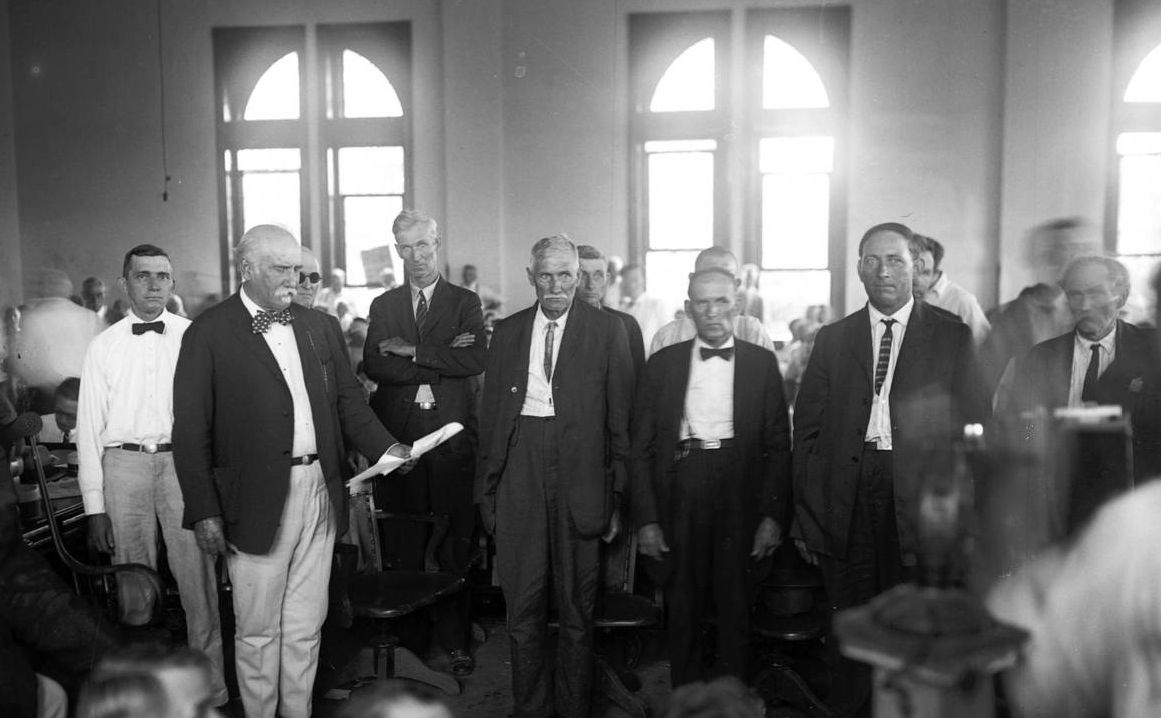
The jury foreman reads the verdict in the Scopes trial.
A producer for NBC's today show called me this morning to say, "Thanks, but no thanks." The Today Show will be running a segment next Tuesday in which two scholars will debate the question "What is THE trial of the century?" (Yes, I agree that all these "blank-of-the-century"debates are somewhat silly, but I'm willing to play along). I was one of two finalists for the honor of debating Professor Charles Ogletree of Harvard who will contend that the O.J. Simpson trial was the century's greatest. I guess I never will meet Katie Couric.
But since NBC asked (and so has the Washington Post, the AP, the Fox News Channel, and assorted AM talk show hosts), I've decided to tell you what really is the trial of the century.
First, a few serious contenders. The Hauptmann "Lindbergh Kidnapping" Trial was called at the time "the greatest story since the Resurrection." It WAS a great story, involving the greatest hero of our century, every parent's worst nightmare, and a first-rate whodunit complete with ransom money passed in dark cemeteries and witnesses that could hardly be dreamt up in Hollywood. For sustained day-to-day public attention, the Hauptmann Trial, covered by more reporters than covered World War II, ranks number one. The Nuremberg Trials, however, were of far greater significance (though not truly American trials, and so probably disqualified). So was the "Rodney King Beating" Trial that led to massive riots and 58 deaths. More significant too were the Scottsboro Trials of the 1930's that produced two landmark Supreme Court decisions, reshaped race relations, and produced a terrific story of heroism in the person of Judge James Horton who set aside the guilty verdict of black rape defendant Haywood Patterson knowing that it would almost certainly end his career as an elected judge in Alabama.
But I was asked to pick only one trial: THE greatest trial of the twentieth century. That honor, of course, must go to the "Monkey Trial" of 1925, which considered whether Tennessee could prosecute John Scopes for teaching the theory of evolution in a public school science class. So why is the Scopes trial, not the Simpson trial, THE trial of the century? Let me count five ways:
1. The Scopes Trial already has stood the test of time. Seventy-five years later it stands as the most talked about trial of the first part of the twentieth century. How many people will give a hoot about the OJ Trial in the year 2070?
2. The Scopes Trial brought together America's greatest defense attorney, Clarence Darrow, its greatest political orator and a sort of Fundamentalist Pope, three-time presidential candidate William Jennings Bryan, and its greatest and most acerbic journalist, H. L. Mencken....Johnnie Cochran, Marcia Clark, Geraldo Rivera. Enough said.
3. The Scopes Trial produced what the New York Times called "the most amazing courtroom scene in Anglo-American history," the calling of prosecutor William Jennings Bryan to the stand by Clarence Darrow for examination on the question of whether every story in the Bible was literally true. If that weren't strange enough, the examination took place in the courthouse lawn before a crowd of thousands after the judge expressed concern that the courtroom floor might cave in because of the weight of spectators....Yes, there were those gloves that didn't fit well.
4. The Scopes Trial inspired "Inherit the Wind," one of the greatest courtroom dramas ever starring Spencer Tracy as Darrow, Fredric March as Bryan, and Gene Kelly as Mencken....And the Simpson Trial inspired what?
5. The OJ Trial was a domestic murder, one of thousands that happen each year. The facts of the case had nothing, really, to do with race. The main significance of the Simpson trial is as a lesson for judges and prosecutors in how not to conduct a trial....The Scopes Trial, on the other hand, was about ideas. It was about whether Science and Religion could be reconciled. It was a symbolic struggle for America's culture between the forces of Traditionalism and the forces of Modernism. It was about whether we look for guidance from, as Bryan said "the faith of our fathers," or from our own intellects. The Scopes Trial was about what much of the twentieth century has been about.
Tune in the Today Show on Tuesday and find out why I'm wrong.
--Doug Linder, January 28, 1999
